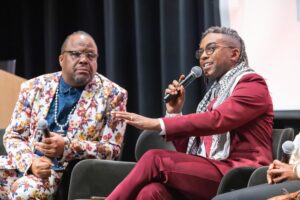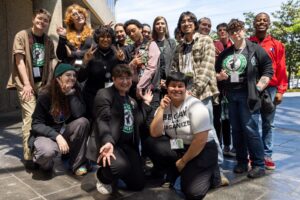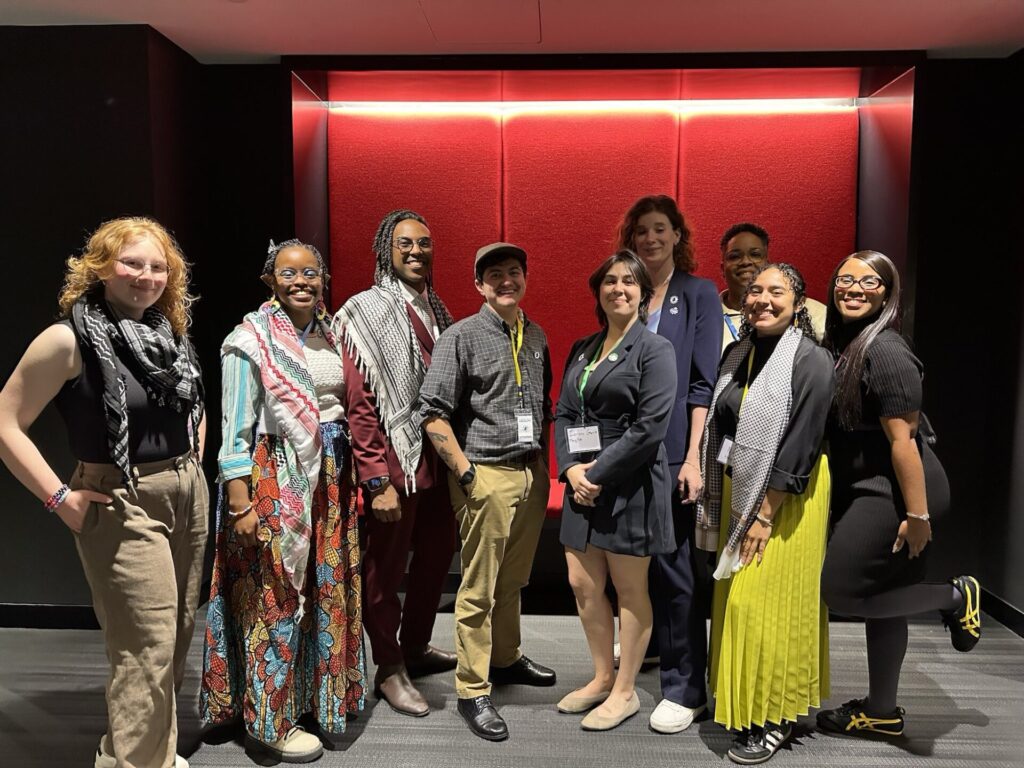Pride isn’t just about rainbow logos — it’s about real accountability. LGBTQ workers, not just consumers, deserve corporations that stand up and show up for them all year long.
In a unanimous vote this spring, Garden State Equality workers successfully formed a workers union. Leadership recognized the five eligible union workers officially under Garden State Equality Workers United (GSEWU).
Most, if not all, members of the union are GLAAD Media Institute Alumni, or those who have completed a media training session with the Institute. Workers said the training helped them prepare media statements ahead of announcing their unionizing efforts, something their communication’s manager said stumped colleagues in the past.
The media training session “definitely” helped staffers committed to unionizing, Communications Manager and Union Member Aedy Miller told GLAAD. Especially when staff was asked to write “one to two sentence statements about why you personally are doing this,” Miller continued.

GLAAD’s most recent research found 81% of Americans believe freedom means we all should be able to believe and behave as we choose, as long as it isn’t hurting anyone else.
Considering this, Garden State Equality representatives tell us why their organization unionized in interviews GLAAD conducted in April. Some interviewees had a desire to broaden their scope of impact at New Jersey’s largest LGBTQ advocacy organization. Others say their leadership inspired them to unionize in addition to other workers’ stories like Starbucks Workers United, Equality Ohio Workers United, among others.
“We’re unionizing because we care deeply about the organization we work for,” Miller said. “We want to be able to show to other movement workers [that] this is possible.”
Miller, a GLAAD Media Institute alum herself, adds that this move was “wrapped in a precedent” for the future, especially under a federal administration dedicated to destroying unions, and eradicating LGBTQ people, particularly transgender, nonbinary and gender nonconforming people.
Garden State Equality’s leadership team wrote a signed statement to social media.
Christian Fuscarino – the organization’s executive director and also a GLAAD Media Institute Alum – said he stands by his public statement, and reaffirmed it.
View this post on Instagram
“The LGBTQ+ movement and the labor movement have long been intertwined — both rooted in the pursuit of dignity, justice, and equity for all people. Everyone at Garden State Equality fully supports the group of employees seeking to unionize as they engage in this democratic process. We are proud that all parties agreed to a fair and timely election overseen by the NLRB. This moment is a reflection of what we believe in: centering workers’ rights, especially in nonprofit spaces, is core to our values of anti-racism and achieving true equality at work,” Fuscarino reemphasized through a text message.
Reginald Webber Jr., Executive Assistant and union supporter says “all workers should be unionized,” a belief he says he’s always held.

When it comes to Garden State Equality Webber adds that it is “one of the healthiest environments” he’s ever worked in, and that he wants to stay to continue to fight the good fight with his at-large team.
Additionally, GLAAD’s research states that 85% of consumers believe CEOs have a responsibility to speak up about issues that matter to them. Knowing this, Garden State Equality Workers United hopes to build solidarity across state lines with consumers who are also workers. Much like with Starbucks Workers United in Oklahoma City.
Neha Cremin, a former-member, and continued collaborator, of Starbucks Workers United, told GLAAD that what Garden State Equality Workers United is organizing toward is “powerful,” and shows how her own collective organizing in an Oklahoma City Starbucks has prompted many other LGBTQ workers to act.
“I really don’t know what other path to power trans liberation and trans people have at this point, except through [the] labor movement,” Cremin said about Garden State Equality’s unionizing efforts.
View this post on Instagram
Cremin started working at Starbucks after getting kicked out of her parents house as a trans teenager in Oklahoma City. She didn’t have financial stability or access to college. And while she had access to some of her gender-affirming care, it wasn’t everything she needed. After consulting community members, Cremin decided to apply to Starbucks, a corporation that would provide full gender-affirming care coverage for trans workers.
For decades, chronic misconceptions fueled by the unfamiliarity of trans people have encouraged systematic blocks to job stability. For example, less than a quarter of non-LGBTQ Americans (22%) actually know a transgender person, according to Accelerating Acceptance 2025. Anti-trans crusaders often take advantage of this statistic to spread disinformation in mainstream news like the New York Times, which then informs bills, or rulings like those of Skrmetti v. Tennessee.
From the job search to the hiring process, challenges tend to arise particularly if a legal name or gender marker on an identity document (like a driver’s license) does not match the outward appearance of the applicant, which can lead to many forms of harassment and discrimination, according to Movement Advancement Project (MAP).
When Cremin and her colleagues joined a growing U.S. movement of Starbucks baristas in demanding justice at work, including protections on core issues like respect, living wages, racial and gender equity, and fair scheduling, Starbucks had an interesting reaction.
Starbucks threatened to recede trans healthcare coverage as a union busting tactic, says Cremin.
The insurance plan “was so you could see any provider you wanted across the country, surgeries were almost entirely, if not, fully covered,” said Cremin, “Now the workers cannot use the supplemental health insurance benefit.” A benefit which fully covered care under secondary insurance after an initial denial of care coverage from primary insurance.

Suddenly, in 2022, Cremin says she, among other Starbucks workers, began having to pay out-of-pocket costs for gender-affirming care. Today, Cremin says this barrier continues to impact Starbucks workers regardless of union status, but that barriers began mounting after unionizing efforts swelled in Starbucks stores across the U.S.
“At Starbucks, our commitment to the transgender community is unwavering — every eligible partner (employee) continues to have access to comprehensive, gender-affirming care through our industry-leading health benefits. No matter who you are, or how you identify, we are here to support you,” a Starbucks spokesperson told GLAAD in an email.
In 2023, the National Labor Relations Board (NLRB) found Starbucks to have unlawfully threatened to withhold healthcare benefits, and they filed over 80 complaints against Starbucks for violating federal labor law. In addition, there have been over 500 unfair labor practice charges lodged against this company, according to a report by Health, Education, Labor, and Pensions Committees Chair Bernard Sanders.
It’s stories like this that motivated Garden State Equality to unionize in the first place.
“Starbucks Workers United, they are very pro-LGBTQ, and that’s inspirational,” Miller said. “And Garden State Equality Workers United wants to be able to say: ‘queer and trans workers deserve to be empowered in their workplace.’”
For Miller and Reginald, focusing on labor is a continuation of their organization’s mission for “legal and lived equality.”
Equality Ohio Workers United said their movement partner’s focus affirms their efforts.
“I think it felt affirming to see a sibling organization that’s doing similar work to what we do in another part of the country decide that this was a worthwhile, important enough step to take,” Joseph Soza, central organizer of Equality Ohio and a member of the nonprofit’s workers union (Equality Ohio Workers United), said.
In the end, Garden State Equality Workers United reminds people that corporate accountability and the need for worker and LGBTQ solidarity across the U.S. and the globe is necessary for long-lasting change we can experience all year round and in years to come.
More about the GLAAD Media Institute: The GLAAD Media Institute provides training, consultation, and actionable research to develop an army of social justice ambassadors for all marginalized communities to champion acceptance and amplify media impact. Using the best practices, tools, and techniques we’ve perfected over the past 30 years, the GLAAD Media Institute turns education into armor for today’s culture war—transforming individuals into compelling storytellers, media-savvy navigators, and mighty ambassadors whose voices break through the noise and incite real change. Activate with the GLAAD Media Institute now at glaad.org/institute.













